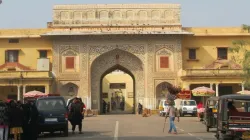Ajanta and Ellora Caves to Taj Mahal, UNESCO World Heritage sites in India that you should visit this year
If you're confused where to travel this year, UNESCO World Heritage sites could be your destination. There are 43 sites in India. Here are some of UNESCO World Heritage sites.

UNESCO, also known as the United Nations Educational, Scientific and Cultural Organization, is an organisation that protects and preserves cultural and natural heritage across the world. According to UNESCO World Heritage Convention, "What makes the concept of World Heritage exceptional is its universal application. World Heritage sites belong to all the peoples of the world, irrespective of the territory on which they are located."
There are 1223 sites on the World Heritage List and 43 of them are located in India. Italy tops the list with 60 World Heritage sites, followed by China with 59 sites. If you're confused as to where you should travel this year, you could choose UNESCO World Heritage sites that are there in India.
Here, take a look at some of UNESCO World Heritage sites.
Ajanta and Ellora Caves
These caves are some of the earliest Buddhist architectures. They are known for their sculptures and murals. Ajanta Caves date from the 2nd and 1st centuries B.C. The paintings and sculptures of Ajanta are masterpieces of Buddhist religious art. On the other hand, Ellora Caves have 34 monasteries and temples themed around Buddhism, Hinduism and Jainism.
Sunderbans National Park
This national park covers nearly 10,000 sq km of land and water in the Ganges delta. It houses the world's largest mangrove forests. The Sundarbans also have several rare or endangered species living in the park, including tigers, aquatic mammals, birds and reptiles.
Taj Mahal
This is an immense mausoleum of white marble that was built in Agra between 1631 and 1648. The Taj Mahal is considered to be the greatest architectural achievement in the whole range of Indo-Islamic architecture, says UNESCO. It was built by Mughal Emperor Shah Jahan in memory of his wife Mumtaz Mahal.
Rani-ki-Vav
This was build as a memorial to a kind in the 11th century AD. Initially, it was a form of subterranean water resource and storage system, however, it later turned out to be a multi-storey work of art and architecture.
Great Living Chola Temples
These temples were built by the kings of the Chola Empire and they stretched all over South India. The World Heritage site includes three temples; the Brihadisvara Temple at Thanjavur, the Brihadisvara Temple at Gangaikondacholisvaram and the Airavatesvara Temple at Darasuram. These temples stand as a testament to the achievements of the Chola dynasty.
ALSO READ: Mahakumbh 2025: Ram ghat to Arail ghat, know importance of these ghats in Prayagraj